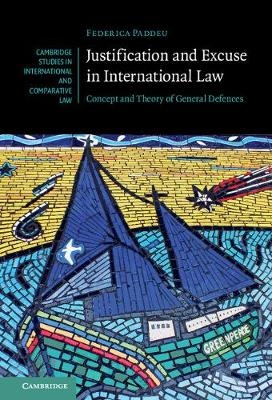
Justification and Excuse in International Law
Concept and Theory of General Defences
Seiten
2018
Cambridge University Press (Verlag)
978-1-107-10620-8 (ISBN)
Cambridge University Press (Verlag)
978-1-107-10620-8 (ISBN)
The defences available to a state under the law of state responsibility can be considered either as justifications (which render acts lawful) or excuses (excluding the responsibility of the state for wrongful conduct). This book is the first to comprehensively examine the distinction, informed by state practice and theoretical considerations.
The defences available to an agent accused of wrongdoing can be considered as justifications (which render acts lawful) or excuses (which shield the agent from the legal consequences of the wrongful act). This distinction is familiar to many domestic legal systems, and tracks analogous notions in moral philosophy and ordinary language. Nevertheless, it remains contested in some domestic jurisdictions where it is often argued that the distinction is purely theoretical and has no consequences in practice. In international law too the distinction has been fraught with controversy, though there are increasing calls for its recognition. This book is the first to comprehensively and thoroughly examine the distinction and its relevance to the international legal order. Combining an analysis of state practice, and historical, doctrinal and theoretical developments, the book shows that the distinction is not only possible in international law but that it is also one that would have important practical implications.
The defences available to an agent accused of wrongdoing can be considered as justifications (which render acts lawful) or excuses (which shield the agent from the legal consequences of the wrongful act). This distinction is familiar to many domestic legal systems, and tracks analogous notions in moral philosophy and ordinary language. Nevertheless, it remains contested in some domestic jurisdictions where it is often argued that the distinction is purely theoretical and has no consequences in practice. In international law too the distinction has been fraught with controversy, though there are increasing calls for its recognition. This book is the first to comprehensively and thoroughly examine the distinction and its relevance to the international legal order. Combining an analysis of state practice, and historical, doctrinal and theoretical developments, the book shows that the distinction is not only possible in international law but that it is also one that would have important practical implications.
Federica Paddeu is the John Tiley Fellow in Law at Queens' College, Cambridge and a fellow at the Lauterpacht Centre for International Law, Cambridge.
Introduction; Part I. Justification and Excuse in International Law: 1. Justification and excuse in international law; 2. Practical consequences of the distinction in international law; 3. Classifying defences into justification and excuse in international law; Part II. Classifying the Defences in the Articles on State Responsibility: 4. Consent; 5. Self-defence; 6. Countermeasures; 7. Force majeure; 8. State of necessity; 9. Distress; Conclusion.
| Erscheinungsdatum | 23.06.2017 |
|---|---|
| Reihe/Serie | Cambridge Studies in International and Comparative Law |
| Verlagsort | Cambridge |
| Sprache | englisch |
| Maße | 159 x 235 mm |
| Gewicht | 960 g |
| Themenwelt | Recht / Steuern ► EU / Internationales Recht |
| Sozialwissenschaften ► Politik / Verwaltung ► Europäische / Internationale Politik | |
| ISBN-10 | 1-107-10620-6 / 1107106206 |
| ISBN-13 | 978-1-107-10620-8 / 9781107106208 |
| Zustand | Neuware |
| Haben Sie eine Frage zum Produkt? |
Mehr entdecken
aus dem Bereich
aus dem Bereich
Studienbuch
Buch | Hardcover (2023)
De Gruyter Oldenbourg (Verlag)
44,95 €
erfolgreiche Interessenvertretung durch Prozesskompetenz im komplexen …
Buch | Hardcover (2023)
Wiley-VCH (Verlag)
42,00 €


